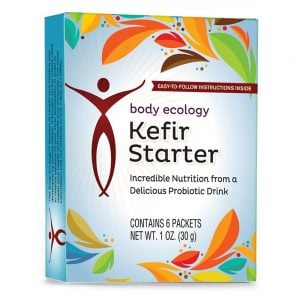How to Protect Your Body from Insufficient Sleep
Lost sleep may be harming you more than you think.
According to research, when our sleep is disrupted on a regular basis, this can lead to an inflamed and leaky gut—especially when it happens in combination with a poor diet. (1)

If you’re not getting enough sleep, your health could be at risk. Support your gut with probiotics from coconut water kefir, made from the Kefir Starter, to protect against the dangerous effects of a disrupted circadian rhythm.
Robin Voigt, an assistant professor at Rush Medical College, and her colleagues recently found that poor sleep patterns may promote intestinal inflammation. She explains that with a high-sugar and high-fat diet, a disrupted circadian rhythm appears to change the inner ecosystem. This includes the growth of pro-inflammatory microbes and the release of pro-inflammatory signals.
This overgrowth of pro-inflammatory microbes is called dysbiosis.
Dysbiosis is an imbalance of the inner ecosystem within the intestinal tract, where the bad bugs outnumber the good. Dysbiosis increases the risk for gastrointestinal discomfort (like heartburn and gas) or even diseases associated with inflammation—like heart disease and cancer.
Sleep Trouble Means Hormonal Imbalance
In the human body, the circadian rhythm creates a 24-hour cycle. Sleep is a part of this cycle.
In a healthy individual, levels of cortisol (a stress hormone) are at their highest during the day. Levels of melatonin (a “nighttime” hormone and antioxidant) are at their highest during the night. These hormones—cortisol and melatonin—cue and regulate the circadian rhythm. Dr. Voigt explains that, “Sleep is a consequence of circadian rhythms.” (2)
When we repeatedly disrupt the circadian rhythm and cheat our body of the sleep that it needs, we also disrupt the release of hormones that keep this cycle intact.
Repeated disruption of the circadian rhythm increases our risk for:
- Obesity
- Diabetes
- High blood pressure
- Inflammation
- Heart disease
- Depression
According to Dr. Voigt, changes in the inner ecosystem may be contributing to those serious, long-term disease patterns listed above. “We believe that chronic circadian rhythm disruption promotes/exacerbates inflammatory-mediated diseases, at least in part, due to changes in the intestinal microbiota.”
Not Getting Enough Sleep? A Strong Inner Ecosystem to the Rescue
If you find yourself in a situation where you must miss sleep—day after day—or where you get your shuteye during daytime hours, not all is lost.
According to Dr. Voigt, probiotics and prebiotics can help reduce the harmful effects of circadian rhythm disruption. These effects include:
- A wounded inner ecosystem, or the shift from good microbes to bad
- Inflammation
“It’s something that needs to be addressed,” Dr Voigt explains. “…take precautions, watch your diet, take pre- and probiotics, monitor your health, be vigilant.”
A diet that is high in sugar and processed, refined fats (such as canola oil, vegetable oil, and soybean oil) is a pro-inflammatory diet. Poor diet coupled with missed sleep is a recipe for digestive disaster.
The Body Ecology Diet is a mainly plant-based diet that removes pro-inflammatory foods like sugar, gluten, and casein. It rebuilds the gut with probiotic-rich, fermented foods such as cultured vegetables and coconut water kefir.
Research has even shown that fermented foods are more effective than a probiotic supplement. (3) Prebiotics act as food for probiotics and can boost the strength of fermented foods.
While you may not be able to control when you sleep, according to Dr. Voigt, diet and probiotics can help you surf the hazards of poor sleep and a disrupted circadian rhythm.
What To Remember Most About This Article:
We’ve all had a sleepless night or two, but lost sleep over the long-term is a major cause for concern. Regularly disrupted sleep can cause an inflamed, leaky gut—exacerbated by a poor diet. Researchers have discovered that poor sleep patterns may promote intestinal inflammation with changes to the inner ecosystem.
Sleep is regulated by the 24-hour cycle of the circadian rhythm. When this natural cycle is constantly disrupted by lost sleep, hormone imbalance can occur. Risk for obesity, diabetes, heart disease, and depression can also increase.
Research supports probiotics and prebiotics to restore health, even after circadian rhythm disruption. Probiotics and prebiotics can heal a wounded inner ecosystem and calm inflammation.
If you’re suffering from lost or restless sleep, support your health by:
- Following The Body Ecology Diet—free from pro-inflammatory foods like sugar, gluten, and casein.
- Eating probiotic-rich, fermented foods—like cultured vegetables and coconut water kefir.
- Strengthening the probiotics you eat—with beneficial prebiotics.
- [product id=”22″]
- [product id=”1″]
- [product id=”2″]
- [product id=”3″]
REFERENCES:
- Voigt RM, Forsyth CB, Green SJ, Mutlu E, et al. (2014) Circadian Disorganization Alters Intestinal Microbiota. PLoS ONE 9(5): e97500.
- Medical Xpress. (2014, May 21). Disruption of circadian rhythms may contribute to inflammatory disease. Retrieved from http://medicalxpress.com/news/2014-05-disruption-circadian-rhythms-contribute-inflammatory.html
- Faye, T., Tamburello, A., Vegarud, G. E., & Skeie, S. (2012). Survival of lactic acid bacteria from fermented milks in an in vitro digestion model exploiting sequential incubation in human gastric and duodenum juice. Journal of dairy science, 95(2), 558-566.








